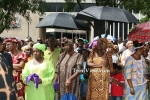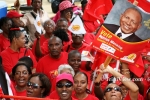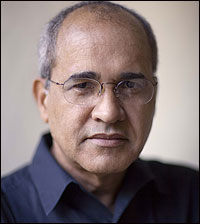By Dr. Selwyn R. Cudjoe
July 23, 2008
 Most of us will revel in African sartorial splendor during the next week. Such displays signal a magnificent achievement of which the Emancipation Support Committee (ESC) should be proud. It has made African Trinbagonians aware of their heritage and, at least for a week, makes us reflect on the land of our origin. As we reflect, it is well to ponder how this awareness coincides with our threatened re-enslavement in our adopted land.
Most of us will revel in African sartorial splendor during the next week. Such displays signal a magnificent achievement of which the Emancipation Support Committee (ESC) should be proud. It has made African Trinbagonians aware of their heritage and, at least for a week, makes us reflect on the land of our origin. As we reflect, it is well to ponder how this awareness coincides with our threatened re-enslavement in our adopted land.
Continue reading Emancipation and Self-Reflection

 Teachers feel “disempowered” and “abandoned” on the issue of corporal punishment and classroom control as students mock them saying “Government say yuh cyar do me nothing”.
Teachers feel “disempowered” and “abandoned” on the issue of corporal punishment and classroom control as students mock them saying “Government say yuh cyar do me nothing”.  Barbados: 16 and Under
Barbados: 16 and Under Five months ago, the PNM was elected to serve as the Government of the people of T&T although it received 43 per cent of the votes.
Five months ago, the PNM was elected to serve as the Government of the people of T&T although it received 43 per cent of the votes.  In his 1972 article titled “The meaning of development”, Professor Dudley Sears argued that “a country which had doubled per capita income could not claim to have experienced development if poverty, inequality, (inflation/ spiraling high cost of living, food shortages, human safety/security, level of crimes) and unemployment had not been reduced.”
In his 1972 article titled “The meaning of development”, Professor Dudley Sears argued that “a country which had doubled per capita income could not claim to have experienced development if poverty, inequality, (inflation/ spiraling high cost of living, food shortages, human safety/security, level of crimes) and unemployment had not been reduced.” September 2001: “Focus on agriculture declined from as far back as the first oil boom of 1973-79, when, with oil prices increasing at a dizzying pace, food production was no longer an attractive option. Like most oil-rich countries, Trinidad and Tobago felt it had the money to purchase its food requirements from low cost (though highly subsidised) producers in developed countries.
September 2001: “Focus on agriculture declined from as far back as the first oil boom of 1973-79, when, with oil prices increasing at a dizzying pace, food production was no longer an attractive option. Like most oil-rich countries, Trinidad and Tobago felt it had the money to purchase its food requirements from low cost (though highly subsidised) producers in developed countries. Three decades ago I met Arnold Rampersad when he joined the African American faculty at Harvard University as a professor. At the time I was an assistant professor at Harvard, having received my doctorate from Cornell University and having taught previously at Ohio University. In those early years I could not foresee the heights to which Professor Rampersad would reach in the academic world.
Three decades ago I met Arnold Rampersad when he joined the African American faculty at Harvard University as a professor. At the time I was an assistant professor at Harvard, having received my doctorate from Cornell University and having taught previously at Ohio University. In those early years I could not foresee the heights to which Professor Rampersad would reach in the academic world.